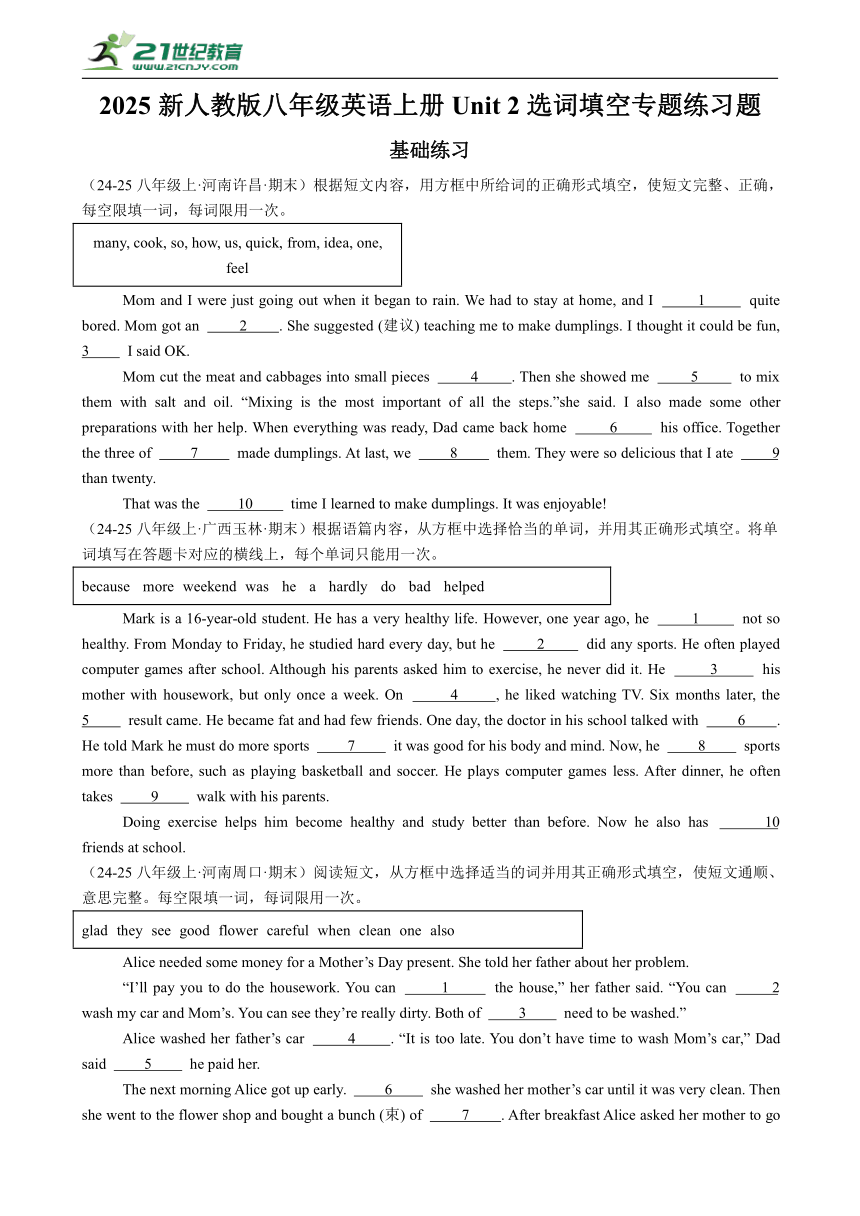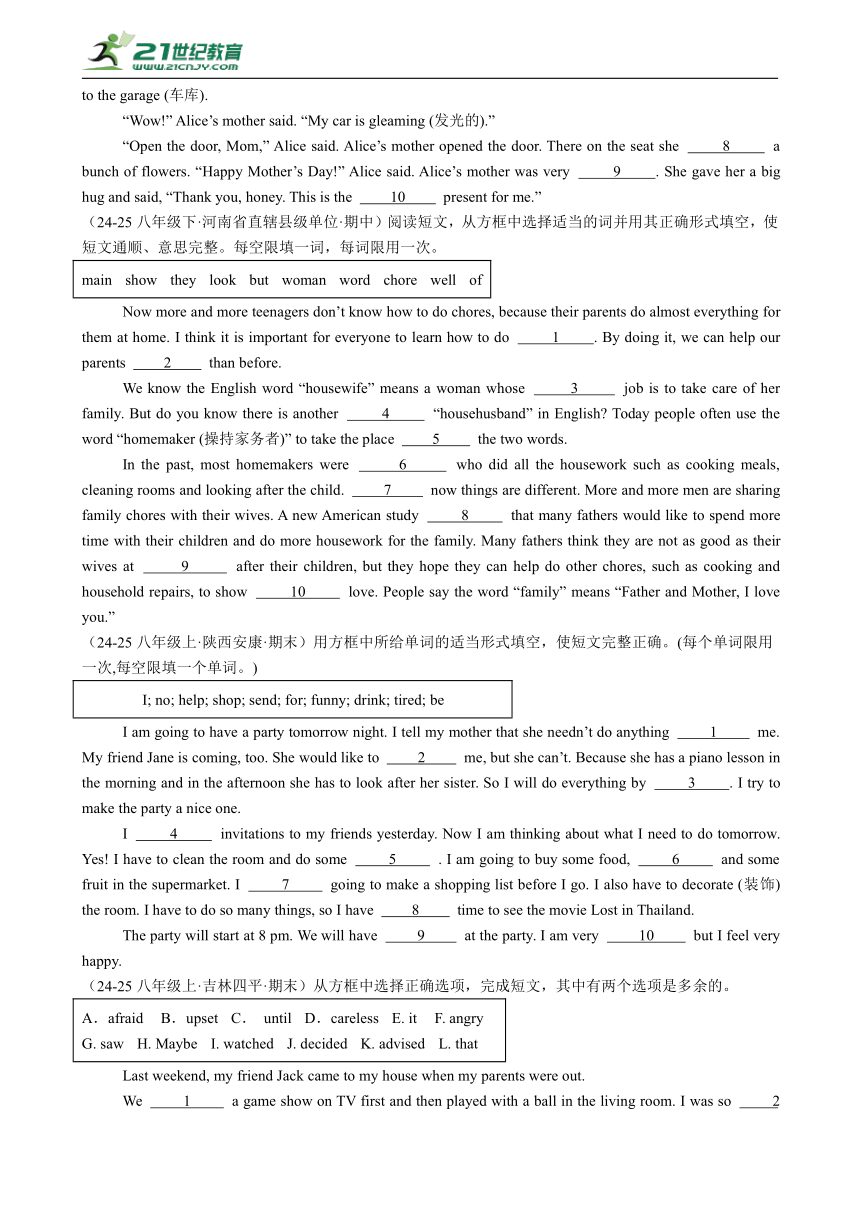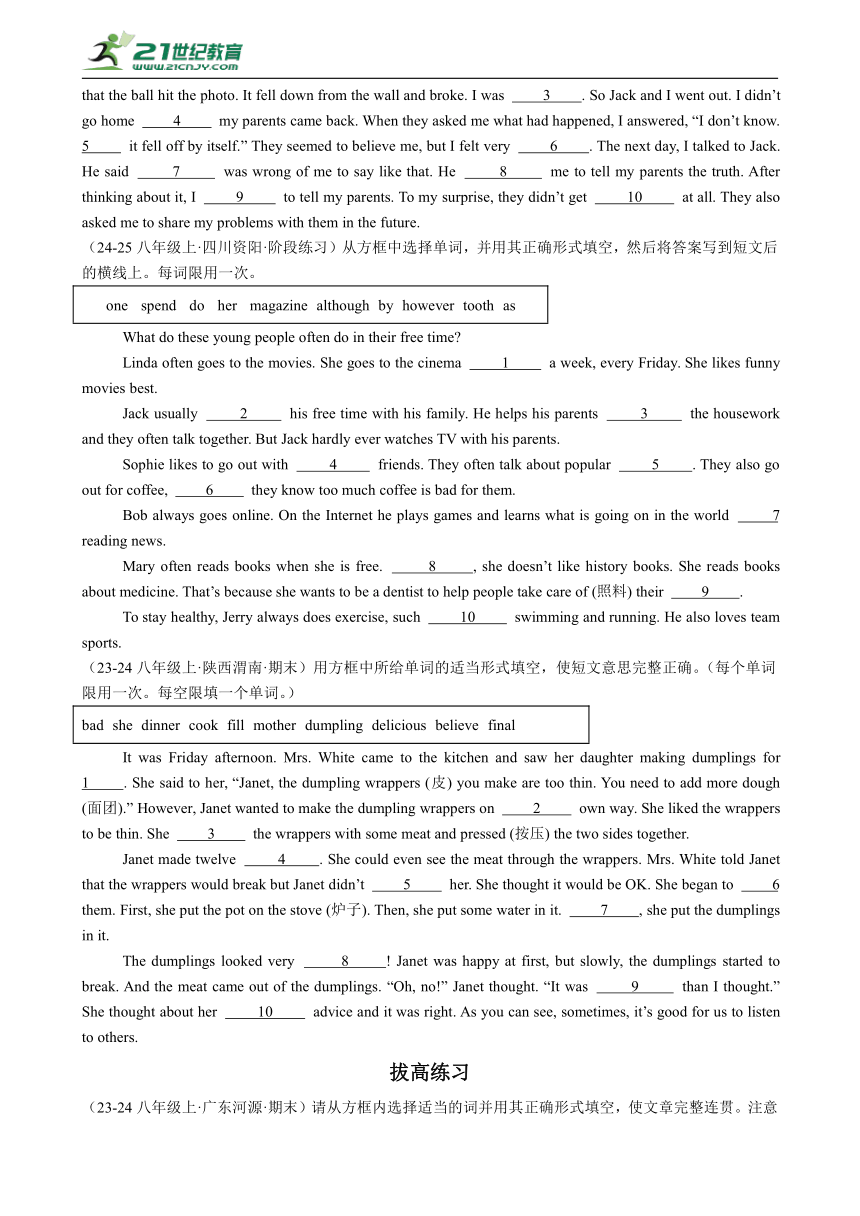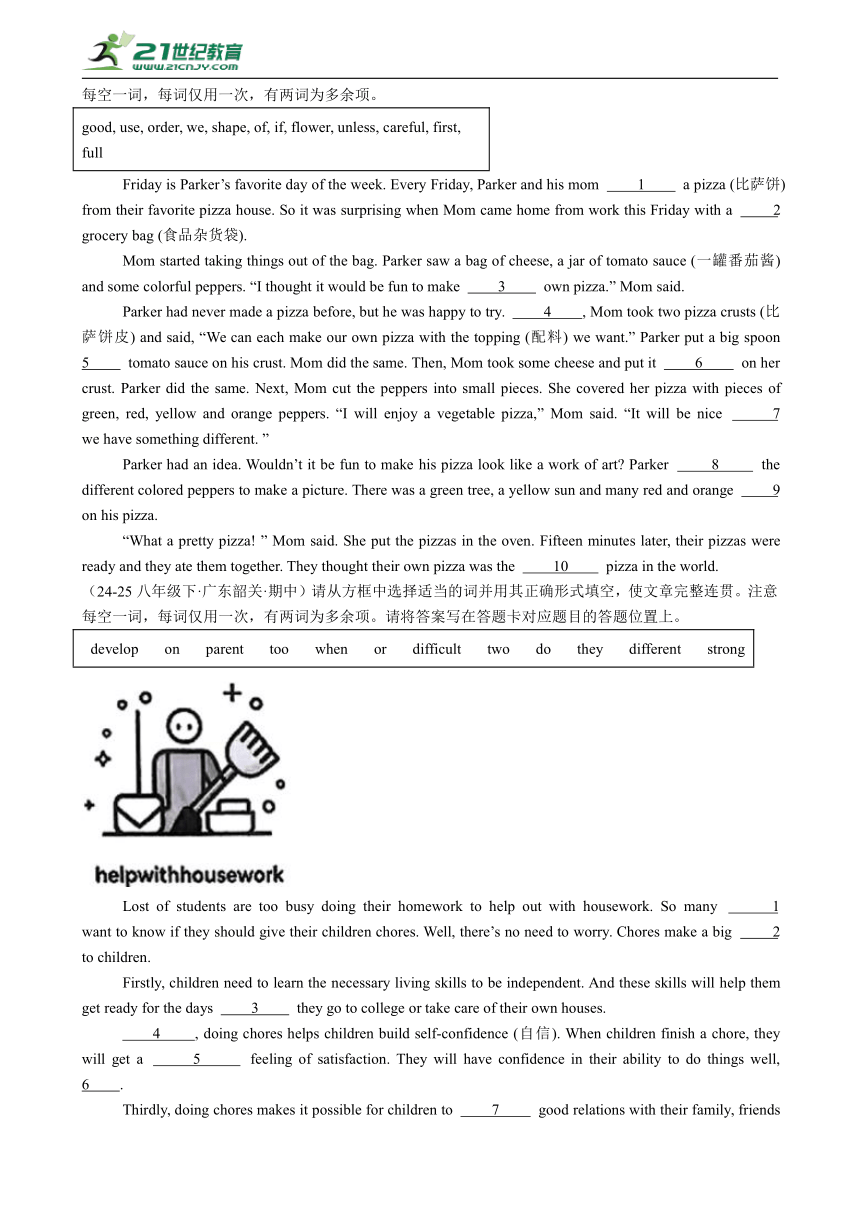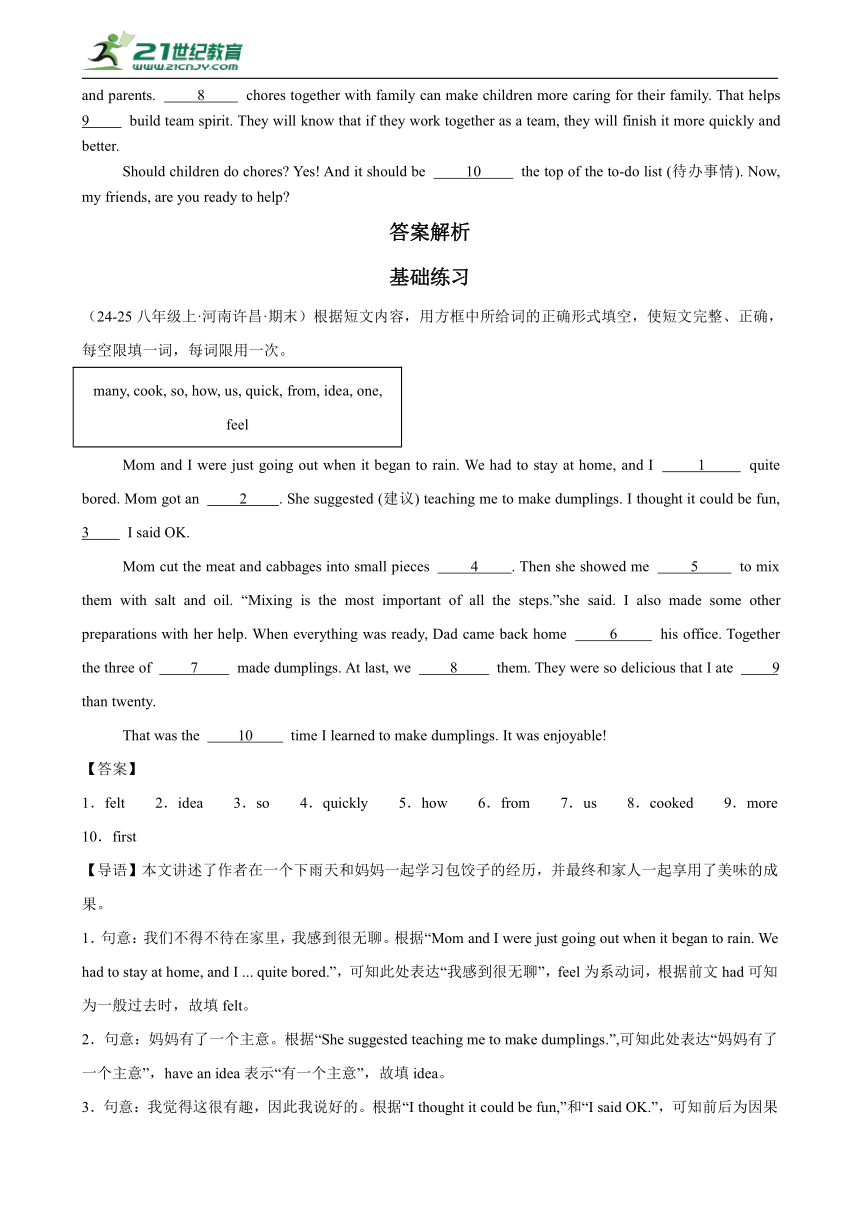 資源簡(jiǎn)介
資源簡(jiǎn)介
2025新人教版八年級(jí)英語(yǔ)上冊(cè)Unit 2選詞填空專題練習(xí)題
基礎(chǔ)練習(xí)
(24-25八年級(jí)上·河南許昌·期末)根據(jù)短文內(nèi)容,用方框中所給詞的正確形式填空,使短文完整、正確,每空限填一詞,每詞限用一次。
many, cook, so, how, us, quick, from, idea, one, feel
Mom and I were just going out when it began to rain. We had to stay at home, and I 1 quite bored. Mom got an 2 . She suggested (建議) teaching me to make dumplings. I thought it could be fun, 3 I said OK.
Mom cut the meat and cabbages into small pieces 4 . Then she showed me 5 to mix them with salt and oil. “Mixing is the most important of all the steps.”she said. I also made some other preparations with her help. When everything was ready, Dad came back home 6 his office. Together the three of 7 made dumplings. At last, we 8 them. They were so delicious that I ate 9 than twenty.
That was the 10 time I learned to make dumplings. It was enjoyable!
(24-25八年級(jí)上·廣西玉林·期末)根據(jù)語(yǔ)篇內(nèi)容,從方框中選擇恰當(dāng)?shù)膯卧~,并用其正確形式填空。將單詞填寫在答題卡對(duì)應(yīng)的橫線上,每個(gè)單詞只能用一次。
because more weekend was he a hardly do bad helped
Mark is a 16-year-old student. He has a very healthy life. However, one year ago, he 1 not so healthy. From Monday to Friday, he studied hard every day, but he 2 did any sports. He often played computer games after school. Although his parents asked him to exercise, he never did it. He 3 his mother with housework, but only once a week. On 4 , he liked watching TV. Six months later, the 5 result came. He became fat and had few friends. One day, the doctor in his school talked with 6 . He told Mark he must do more sports 7 it was good for his body and mind. Now, he 8 sports more than before, such as playing basketball and soccer. He plays computer games less. After dinner, he often takes 9 walk with his parents.
Doing exercise helps him become healthy and study better than before. Now he also has 10 friends at school.
(24-25八年級(jí)上·河南周口·期末)閱讀短文,從方框中選擇適當(dāng)?shù)脑~并用其正確形式填空,使短文通順、意思完整。每空限填一詞,每詞限用一次。
glad they see good flower careful when clean one also
Alice needed some money for a Mother’s Day present. She told her father about her problem.
“I’ll pay you to do the housework. You can 1 the house,” her father said. “You can 2 wash my car and Mom’s. You can see they’re really dirty. Both of 3 need to be washed.”
Alice washed her father’s car 4 . “It is too late. You don’t have time to wash Mom’s car,” Dad said 5 he paid her.
The next morning Alice got up early. 6 she washed her mother’s car until it was very clean. Then she went to the flower shop and bought a bunch (束) of 7 . After breakfast Alice asked her mother to go to the garage (車庫(kù)).
“Wow!” Alice’s mother said. “My car is gleaming (發(fā)光的).”
“Open the door, Mom,” Alice said. Alice’s mother opened the door. There on the seat she 8 a bunch of flowers. “Happy Mother’s Day!” Alice said. Alice’s mother was very 9 . She gave her a big hug and said, “Thank you, honey. This is the 10 present for me.”
(24-25八年級(jí)下·河南省直轄縣級(jí)單位·期中)閱讀短文,從方框中選擇適當(dāng)?shù)脑~并用其正確形式填空,使短文通順、意思完整。每空限填一詞,每詞限用一次。
main show they look but woman word chore well of
Now more and more teenagers don’t know how to do chores, because their parents do almost everything for them at home. I think it is important for everyone to learn how to do 1 . By doing it, we can help our parents 2 than before.
We know the English word “housewife” means a woman whose 3 job is to take care of her family. But do you know there is another 4 “househusband” in English Today people often use the word “homemaker (操持家務(wù)者)” to take the place 5 the two words.
In the past, most homemakers were 6 who did all the housework such as cooking meals, cleaning rooms and looking after the child. 7 now things are different. More and more men are sharing family chores with their wives. A new American study 8 that many fathers would like to spend more time with their children and do more housework for the family. Many fathers think they are not as good as their wives at 9 after their children, but they hope they can help do other chores, such as cooking and household repairs, to show 10 love. People say the word “family” means “Father and Mother, I love you.”
(24-25八年級(jí)上·陜西安康·期末)用方框中所給單詞的適當(dāng)形式填空,使短文完整正確。(每個(gè)單詞限用一次,每空限填一個(gè)單詞。)
I; no; help; shop; send; for; funny; drink; tired; be
I am going to have a party tomorrow night. I tell my mother that she needn’t do anything 1 me. My friend Jane is coming, too. She would like to 2 me, but she can’t. Because she has a piano lesson in the morning and in the afternoon she has to look after her sister. So I will do everything by 3 . I try to make the party a nice one.
I 4 invitations to my friends yesterday. Now I am thinking about what I need to do tomorrow. Yes! I have to clean the room and do some 5 . I am going to buy some food, 6 and some fruit in the supermarket. I 7 going to make a shopping list before I go. I also have to decorate (裝飾) the room. I have to do so many things, so I have 8 time to see the movie Lost in Thailand.
The party will start at 8 pm. We will have 9 at the party. I am very 10 but I feel very happy.
(24-25八年級(jí)上·吉林四平·期末)從方框中選擇正確選項(xiàng),完成短文,其中有兩個(gè)選項(xiàng)是多余的。
A.a(chǎn)fraid B.upset C. until D.careless E. it F. angry G. saw H. Maybe I. watched J. decided K. advised L. that
Last weekend, my friend Jack came to my house when my parents were out.
We 1 a game show on TV first and then played with a ball in the living room. I was so 2 that the ball hit the photo. It fell down from the wall and broke. I was 3 . So Jack and I went out. I didn’t go home 4 my parents came back. When they asked me what had happened, I answered, “I don’t know. 5 it fell off by itself.” They seemed to believe me, but I felt very 6 . The next day, I talked to Jack. He said 7 was wrong of me to say like that. He 8 me to tell my parents the truth. After thinking about it, I 9 to tell my parents. To my surprise, they didn’t get 10 at all. They also asked me to share my problems with them in the future.
(24-25八年級(jí)上·四川資陽(yáng)·階段練習(xí))從方框中選擇單詞,并用其正確形式填空,然后將答案寫到短文后的橫線上。每詞限用一次。
one spend do her magazine although by however tooth as
What do these young people often do in their free time
Linda often goes to the movies. She goes to the cinema 1 a week, every Friday. She likes funny movies best.
Jack usually 2 his free time with his family. He helps his parents 3 the housework and they often talk together. But Jack hardly ever watches TV with his parents.
Sophie likes to go out with 4 friends. They often talk about popular 5 . They also go out for coffee, 6 they know too much coffee is bad for them.
Bob always goes online. On the Internet he plays games and learns what is going on in the world 7 reading news.
Mary often reads books when she is free. 8 , she doesn’t like history books. She reads books about medicine. That’s because she wants to be a dentist to help people take care of (照料) their 9 .
To stay healthy, Jerry always does exercise, such 10 swimming and running. He also loves team sports.
(23-24八年級(jí)上·陜西渭南·期末)用方框中所給單詞的適當(dāng)形式填空,使短文意思完整正確。(每個(gè)單詞限用一次。每空限填一個(gè)單詞。)
bad she dinner cook fill mother dumpling delicious believe final
It was Friday afternoon. Mrs. White came to the kitchen and saw her daughter making dumplings for 1 . She said to her, “Janet, the dumpling wrappers (皮) you make are too thin. You need to add more dough (面團(tuán)).” However, Janet wanted to make the dumpling wrappers on 2 own way. She liked the wrappers to be thin. She 3 the wrappers with some meat and pressed (按壓) the two sides together.
Janet made twelve 4 . She could even see the meat through the wrappers. Mrs. White told Janet that the wrappers would break but Janet didn’t 5 her. She thought it would be OK. She began to 6 them. First, she put the pot on the stove (爐子). Then, she put some water in it. 7 , she put the dumplings in it.
The dumplings looked very 8 ! Janet was happy at first, but slowly, the dumplings started to break. And the meat came out of the dumplings. “Oh, no!” Janet thought. “It was 9 than I thought.” She thought about her 10 advice and it was right. As you can see, sometimes, it’s good for us to listen to others.
拔高練習(xí)
(23-24八年級(jí)上·廣東河源·期末)請(qǐng)從方框內(nèi)選擇適當(dāng)?shù)脑~并用其正確形式填空,使文章完整連貫。注意每空一詞,每詞僅用一次,有兩詞為多余項(xiàng)。
good, use, order, we, shape, of, if, flower, unless, careful, first, full
Friday is Parker’s favorite day of the week. Every Friday, Parker and his mom 1 a pizza (比薩餅) from their favorite pizza house. So it was surprising when Mom came home from work this Friday with a 2 grocery bag (食品雜貨袋).
Mom started taking things out of the bag. Parker saw a bag of cheese, a jar of tomato sauce (一罐番茄醬) and some colorful peppers. “I thought it would be fun to make 3 own pizza.” Mom said.
Parker had never made a pizza before, but he was happy to try. 4 , Mom took two pizza crusts (比薩餅皮) and said, “We can each make our own pizza with the topping (配料) we want.” Parker put a big spoon 5 tomato sauce on his crust. Mom did the same. Then, Mom took some cheese and put it 6 on her crust. Parker did the same. Next, Mom cut the peppers into small pieces. She covered her pizza with pieces of green, red, yellow and orange peppers. “I will enjoy a vegetable pizza,” Mom said. “It will be nice 7 we have something different. ”
Parker had an idea. Wouldn’t it be fun to make his pizza look like a work of art Parker 8 the different colored peppers to make a picture. There was a green tree, a yellow sun and many red and orange 9 on his pizza.
“What a pretty pizza! ” Mom said. She put the pizzas in the oven. Fifteen minutes later, their pizzas were ready and they ate them together. They thought their own pizza was the 10 pizza in the world.
(24-25八年級(jí)下·廣東韶關(guān)·期中)請(qǐng)從方框中選擇適當(dāng)?shù)脑~并用其正確形式填空,使文章完整連貫。注意每空一詞,每詞僅用一次,有兩詞為多余項(xiàng)。請(qǐng)將答案寫在答題卡對(duì)應(yīng)題目的答題位置上。
develop on parent too when or difficult two do they different strong
Lost of students are too busy doing their homework to help out with housework. So many 1 want to know if they should give their children chores. Well, there’s no need to worry. Chores make a big 2 to children.
Firstly, children need to learn the necessary living skills to be independent. And these skills will help them get ready for the days 3 they go to college or take care of their own houses.
4 , doing chores helps children build self-confidence (自信). When children finish a chore, they will get a 5 feeling of satisfaction. They will have confidence in their ability to do things well, 6 .
Thirdly, doing chores makes it possible for children to 7 good relations with their family, friends and parents. 8 chores together with family can make children more caring for their family. That helps 9 build team spirit. They will know that if they work together as a team, they will finish it more quickly and better.
Should children do chores Yes! And it should be 10 the top of the to-do list (待辦事情). Now, my friends, are you ready to help
答案解析
基礎(chǔ)練習(xí)
(24-25八年級(jí)上·河南許昌·期末)根據(jù)短文內(nèi)容,用方框中所給詞的正確形式填空,使短文完整、正確,每空限填一詞,每詞限用一次。
many, cook, so, how, us, quick, from, idea, one, feel
Mom and I were just going out when it began to rain. We had to stay at home, and I 1 quite bored. Mom got an 2 . She suggested (建議) teaching me to make dumplings. I thought it could be fun, 3 I said OK.
Mom cut the meat and cabbages into small pieces 4 . Then she showed me 5 to mix them with salt and oil. “Mixing is the most important of all the steps.”she said. I also made some other preparations with her help. When everything was ready, Dad came back home 6 his office. Together the three of 7 made dumplings. At last, we 8 them. They were so delicious that I ate 9 than twenty.
That was the 10 time I learned to make dumplings. It was enjoyable!
【答案】
1.felt 2.idea 3.so 4.quickly 5.how 6.from 7.us 8.cooked 9.more 10.first
【導(dǎo)語(yǔ)】本文講述了作者在一個(gè)下雨天和媽媽一起學(xué)習(xí)包餃子的經(jīng)歷,并最終和家人一起享用了美味的成果。
1.句意:我們不得不待在家里,我感到很無(wú)聊。根據(jù)“Mom and I were just going out when it began to rain. We had to stay at home, and I ... quite bored.”,可知此處表達(dá)“我感到很無(wú)聊”,feel為系動(dòng)詞,根據(jù)前文had可知為一般過(guò)去時(shí),故填felt。
2.句意:媽媽有了一個(gè)主意。根據(jù)“She suggested teaching me to make dumplings.”,可知此處表達(dá)“媽媽有了一個(gè)主意”,have an idea表示“有一個(gè)主意”,故填idea。
3.句意:我覺(jué)得這很有趣,因此我說(shuō)好的。根據(jù)“I thought it could be fun,”和“I said OK.”,可知前后為因果關(guān)系,此處表達(dá)“因此”,故填so。
4.句意:媽媽快速地把肉和卷心菜切成小塊。根據(jù)“Mom cut the meat and cabbages into small pieces”,可知此處修飾動(dòng)詞cut,表達(dá)“快速地”,故填quickly。
5.句意:然后她向我展示了如何把它們和鹽和油混合在一起。根據(jù)“she showed me…to mix them with salt and oil.”,可知此處表達(dá)“她向我展示了如何把它們和鹽和油混合在一起”,how表示“如何”,故填how。
6.句意:爸爸從他的辦公室回家了。根據(jù)“Dad came back home…h(huán)is office.”,可知此處表達(dá)“爸爸從他的辦公室回家”,from表示“從……”,故填from。
7.句意:我們?nèi)齻€(gè)一起包餃子。根據(jù)“Together the three of…made dumplings.”,可知此處表達(dá)“我們?nèi)齻€(gè)一起包餃子”,of為介詞,后跟人稱代詞賓格,故填us。
8.句意:最后,我們煮了它們。根據(jù)“At last, we…them.”,可知此處表達(dá)“最后,我們煮了它們”,cook表示“煮”,根據(jù)前文was可知為一般過(guò)去時(shí),故填cooked。
9.句意:它們太好吃了以至于我吃了二十多。根據(jù)“They were so delicious that I ate…than twenty.”,可知此處表達(dá)“它們太好吃了以至于我吃了二十多”,考查固定短語(yǔ)more than“多于”,故填more。
10.句意:這是我第一次學(xué)包餃子。根據(jù)“That was the…time I learned to make dumplings.”,可知此處表達(dá)“這是我第一次學(xué)包餃子”,所給詞one“一”為基數(shù)詞,其序數(shù)詞為first,表示“第一”,故填first。
(24-25八年級(jí)上·廣西玉林·期末)根據(jù)語(yǔ)篇內(nèi)容,從方框中選擇恰當(dāng)?shù)膯卧~,并用其正確形式填空。將單詞填寫在答題卡對(duì)應(yīng)的橫線上,每個(gè)單詞只能用一次。
because more weekend was he a hardly do bad helped
Mark is a 16-year-old student. He has a very healthy life. However, one year ago, he 1 not so healthy. From Monday to Friday, he studied hard every day, but he 2 did any sports. He often played computer games after school. Although his parents asked him to exercise, he never did it. He 3 his mother with housework, but only once a week. On 4 , he liked watching TV. Six months later, the 5 result came. He became fat and had few friends. One day, the doctor in his school talked with 6 . He told Mark he must do more sports 7 it was good for his body and mind. Now, he 8 sports more than before, such as playing basketball and soccer. He plays computer games less. After dinner, he often takes 9 walk with his parents.
Doing exercise helps him become healthy and study better than before. Now he also has 10 friends at school.
【答案】
1.was 2.hardly 3.helped 4.weekends 5.bad 6.him 7.because 8.does 9.a(chǎn) 10.more
【導(dǎo)語(yǔ)】本文是一篇記敘文,講述馬克改變生活習(xí)慣后變得健康的故事。
1.句意:然而,一年前,他不是那么健康。根據(jù)“one year ago”和備選詞可知,應(yīng)用連系動(dòng)詞was。故填was。
2.句意:從星期一到星期五,他每天都學(xué)習(xí),但幾乎不做任何運(yùn)動(dòng)。根據(jù)“From Monday to Friday, he studied hard every day, but”和轉(zhuǎn)備選詞可知,此句是說(shuō)幾乎不做運(yùn)動(dòng)。hardly“幾乎不”,副詞,狀語(yǔ),修飾動(dòng)詞did。故填hardly。
3.句意:他幫媽媽做家務(wù),但每周只做一次。help sb with sth“幫助某人(做)某事”。此句敘述的是過(guò)去的事,應(yīng)用一般過(guò)去時(shí)。故填helped。
4.句意:在周末,他喜歡看電視。根據(jù)前文“From Monday to Friday, ...”和備選詞可知,此處指周末。on weekends“在周末”。故填weekends。
5.句意:六個(gè)月以后,壞的結(jié)果來(lái)了。根據(jù)下文“He became fat and had few friends.”和備選詞可知,此空應(yīng)填形容詞bad“壞的”,作定語(yǔ),修飾名詞result。故填bad。
6.句意:一天,他學(xué)校的醫(yī)生和他談了談。分析句子結(jié)構(gòu)和備選詞可知,應(yīng)填人稱代詞he的賓格him“他”,做介詞with的賓語(yǔ)。故填him。
7.句意:他告訴馬克,他必須多做運(yùn)動(dòng),因?yàn)檫@對(duì)他的身心都有好處。根據(jù)“he must do more sports”和“it was good for his body and mind”可知,兩句之間是因果關(guān)系,前果后因,用because“因?yàn)椤币龑?dǎo)原因狀語(yǔ)從句。故填because。
8.句意:現(xiàn)在,他比以前做更多的運(yùn)動(dòng),比如打籃球和踢足球。do sports“做運(yùn)動(dòng)”;本句用一般現(xiàn)在時(shí),陳述現(xiàn)在的事實(shí),主語(yǔ)he是單數(shù)。故填does。
9.句意:晚飯后,他經(jīng)常和他的父母。take a walk“散步”。故填a。
10.句意:現(xiàn)在他在學(xué)校也有了更多的朋友。根據(jù)前文“He became fat and had few friends.”和備選詞可知,此句是說(shuō)比以前有了更多的朋友。故填more。
(24-25八年級(jí)上·河南周口·期末)閱讀短文,從方框中選擇適當(dāng)?shù)脑~并用其正確形式填空,使短文通順、意思完整。每空限填一詞,每詞限用一次。
glad they see good flower careful when clean one also
Alice needed some money for a Mother’s Day present. She told her father about her problem.
“I’ll pay you to do the housework. You can 1 the house,” her father said. “You can 2 wash my car and Mom’s. You can see they’re really dirty. Both of 3 need to be washed.”
Alice washed her father’s car 4 . “It is too late. You don’t have time to wash Mom’s car,” Dad said 5 he paid her.
The next morning Alice got up early. 6 she washed her mother’s car until it was very clean. Then she went to the flower shop and bought a bunch (束) of 7 . After breakfast Alice asked her mother to go to the garage (車庫(kù)).
“Wow!” Alice’s mother said. “My car is gleaming (發(fā)光的).”
“Open the door, Mom,” Alice said. Alice’s mother opened the door. There on the seat she 8 a bunch of flowers. “Happy Mother’s Day!” Alice said. Alice’s mother was very 9 . She gave her a big hug and said, “Thank you, honey. This is the 10 present for me.”
【答案】
1.clean 2.a(chǎn)lso 3.them 4.carefully 5.when 6.First 7.flowers 8.saw 9.glad 10.best
【導(dǎo)語(yǔ)】本文講述了愛麗絲想給媽媽買一份母親節(jié)禮物,但是她的錢不夠,所以爸爸讓她通過(guò)勞動(dòng)的方式賺錢,最后媽媽看到愛麗絲精心為她準(zhǔn)備的一切非常感動(dòng)和開心。
1.句意:“你可以打掃房子,”她父親說(shuō)。根據(jù)“You can … the house”結(jié)合備選詞可知,此處應(yīng)指可以打掃房子,clean“打掃”,動(dòng)詞,情態(tài)動(dòng)詞can后應(yīng)用動(dòng)詞原形。故填clean。
2.句意:你還可以洗我和媽媽的車。根據(jù)“You can … the house”與“You can … wash my car and Mom’s.”結(jié)合備選詞可知,可以打掃房子也可以洗車,also“也”,位于情態(tài)動(dòng)詞之后實(shí)義動(dòng)詞之前。故填also。
3.句意:兩輛車都需要洗一洗。根據(jù)“my car and Mom’s”與“Both of … need to be washed.”結(jié)合備選詞可知,此處應(yīng)指兩輛車都需要洗,both of them“兩者都”。故填them。
4.句意:愛麗絲仔細(xì)地洗她爸爸的車。根據(jù)“Alice washed her father’s car … .”結(jié)合備選詞可知,此處應(yīng)用carefully“仔細(xì)地”,副詞修飾動(dòng)詞。故填carefully。
5.句意:“太遲了。你沒(méi)時(shí)間給媽媽洗車,”爸爸付錢的時(shí)候?qū)λf(shuō)。根據(jù)“Dad said … he paid her.”結(jié)合備選詞可知,此處應(yīng)指爸爸付錢的時(shí)候?qū)λf(shuō),when“當(dāng)……時(shí)候”。故填when。
6.句意:首先,她把媽媽的車洗得很干凈。根據(jù)“Then”結(jié)合語(yǔ)境與備選詞可知,此處應(yīng)指首先她把媽媽的車洗得很干凈,first“首先”,句子開頭首字母大寫。故填First。
7.句意:然后她去花店買了一束花。根據(jù)“a bunch (束) of”結(jié)合備選詞可知,此處應(yīng)指一束花,flower“花”,可數(shù)名詞,此處應(yīng)用復(fù)數(shù)形式flowers。故填flowers。
8.句意:她看見座位上有一束花。根據(jù)“There on the seat she … a bunch of flowers.”結(jié)合備選詞可知,此處應(yīng)指看見座位上有一束花,see“看見”,動(dòng)詞,時(shí)態(tài)應(yīng)用一般過(guò)去式,因此應(yīng)用其過(guò)去式saw。故填saw。
9.句意:愛麗絲的媽媽非常高興。根據(jù)“Alice’s mother was very … .”結(jié)合備選詞可知,此處應(yīng)指非常高興,因此應(yīng)用glad“高興的”,形容詞作表語(yǔ)。故填glad。
10.句意:這是給我最好的禮物。根據(jù)“This is the … present for me.”結(jié)合備選詞可知,此處應(yīng)指最好的生日禮物,best“最好的”,形容詞作定語(yǔ)。故填best。
(24-25八年級(jí)下·河南省直轄縣級(jí)單位·期中)閱讀短文,從方框中選擇適當(dāng)?shù)脑~并用其正確形式填空,使短文通順、意思完整。每空限填一詞,每詞限用一次。
main show they look but woman word chore well of
Now more and more teenagers don’t know how to do chores, because their parents do almost everything for them at home. I think it is important for everyone to learn how to do 1 . By doing it, we can help our parents 2 than before.
We know the English word “housewife” means a woman whose 3 job is to take care of her family. But do you know there is another 4 “househusband” in English Today people often use the word “homemaker (操持家務(wù)者)” to take the place 5 the two words.
In the past, most homemakers were 6 who did all the housework such as cooking meals, cleaning rooms and looking after the child. 7 now things are different. More and more men are sharing family chores with their wives. A new American study 8 that many fathers would like to spend more time with their children and do more housework for the family. Many fathers think they are not as good as their wives at 9 after their children, but they hope they can help do other chores, such as cooking and household repairs, to show 10 love. People say the word “family” means “Father and Mother, I love you.”
【答案】
1.chores 2.better 3.main 4.word 5.of 6.women 7.But 8.shows 9.looking 10.their
【導(dǎo)語(yǔ)】本文主要講述了現(xiàn)代社會(huì)中家務(wù)分工的變化趨勢(shì),以及“家庭主夫”這一新興概念的出現(xiàn)。
1.句意:我認(rèn)為對(duì)每個(gè)人來(lái)說(shuō)學(xué)習(xí)如何做家務(wù)是很重要的。根據(jù)“Now more and more teenagers don’t know how to do ...”可知這里需要填一個(gè)名詞,表示“家務(wù)”,故填chores。
2.句意:通過(guò)做家務(wù),我們可以比以前更好地幫助父母。根據(jù)“help our parents…than before”可知這里需要填一個(gè)副詞比較級(jí),表示“更好地”,故填better。
3.句意:我們知道英語(yǔ)單詞“housewife”指的是主要工作是照顧家庭的女性。根據(jù)“a woman whose…job is to take care of her family”可知這里需要填一個(gè)形容詞,表示“主要的”,故填main。
4.句意:但你知道英語(yǔ)中還有另一個(gè)詞“househusband”嗎?根據(jù)“another…‘househusband’ in English”可知這里需要填一個(gè)名詞,表示“詞”,故填word。
5.句意:現(xiàn)在人們經(jīng)常用“homemaker”這個(gè)詞來(lái)代替這兩個(gè)詞。根據(jù)“to take the place…the two words”可知這里是短語(yǔ)take the place of“代替”,故填of。
6.句意:過(guò)去,大多數(shù)家務(wù)勞動(dòng)者是女性,她們做所有的家務(wù)。根據(jù)“most homemakers were…who did all the housework”可知這里需要填一個(gè)名詞復(fù)數(shù),表示“女性”,故填women。
7.句意:但現(xiàn)在情況不同了。根據(jù)“now things are different”可知這里需要填一個(gè)表示轉(zhuǎn)折的連詞,故填But。
8.句意:一項(xiàng)新的美國(guó)研究表明,許多父親愿意花更多時(shí)間陪伴孩子并為家庭做更多家務(wù)。根據(jù)“A new American study…that many fathers would like to”可知這里需要填一個(gè)動(dòng)詞,表示“展示、表明”,主語(yǔ)是單數(shù),空處用三單形式。故填shows。
9.句意:許多父親認(rèn)為他們?cè)谡疹櫤⒆臃矫娌蝗缙拮幼龅煤谩8鶕?jù)“they are not as good as their wives at…after their children”可知這里需要填一個(gè)動(dòng)詞,表示“照顧”,look after“照顧”,at后接動(dòng)名詞。故填looking。
10.句意:但他們希望通過(guò)做其他家務(wù),如做飯和家庭維修,來(lái)表達(dá)他們的愛。根據(jù)“to show…love”可知這里需要填一個(gè)形容詞性物主代詞,表示“他們的”,故填their。
(24-25八年級(jí)上·陜西安康·期末)用方框中所給單詞的適當(dāng)形式填空,使短文完整正確。(每個(gè)單詞限用一次,每空限填一個(gè)單詞。)
I; no; help; shop; send; for; funny; drink; tired; be
I am going to have a party tomorrow night. I tell my mother that she needn’t do anything 1 me. My friend Jane is coming, too. She would like to 2 me, but she can’t. Because she has a piano lesson in the morning and in the afternoon she has to look after her sister. So I will do everything by 3 . I try to make the party a nice one.
I 4 invitations to my friends yesterday. Now I am thinking about what I need to do tomorrow. Yes! I have to clean the room and do some 5 . I am going to buy some food, 6 and some fruit in the supermarket. I 7 going to make a shopping list before I go. I also have to decorate (裝飾) the room. I have to do so many things, so I have 8 time to see the movie Lost in Thailand.
The party will start at 8 pm. We will have 9 at the party. I am very 10 but I feel very happy.
【答案】
1.for 2.help 3.myself 4.sent 5.shopping 6.drinks 7.a(chǎn)m 8.no 9.fun 10.tired
【導(dǎo)語(yǔ)】本文介紹了作者為即將到來(lái)的聚會(huì)做準(zhǔn)備的事情以及心情。
1.句意:我告訴我媽媽她不需要為我做任何事情。根據(jù)句意和“do anything...me”及備選詞可知,此處表示“為了”,for符合語(yǔ)境。故填for。
2.句意:她想幫我,但她不能。根據(jù)“She would like to...me, but she can’t.”及備選詞可知,此處表示“幫助我”,help符合語(yǔ)境。故填help。
3.句意:所以我將自己完成所有事情。根據(jù)“So I will do everything by...”及備選詞可知,此處用反身代詞表示“靠自己”,myself符合語(yǔ)境。故填myself。
4.句意:我昨天給我的朋友們寄了邀請(qǐng)函。根據(jù)“yesterday”及備選詞可知,此處用動(dòng)詞的過(guò)去式,send的過(guò)去式為sent。故填sent。
5.句意:是的!我得打掃房間并去購(gòu)物。根據(jù)“I am going to buy some food,..”及備選詞可知,此處表示“購(gòu)物”,shopping符合語(yǔ)境。故填shopping。
6.句意:我打算在超市買一些食物、飲料和水果。根據(jù)“buy some food,...and some fruit”及備選詞可知,此處表示“飲料”,drink符合語(yǔ)境,又因?yàn)閐rink為可數(shù)名詞,這里指買多種飲料。故填drinks。
7.句意:我打算在去之前列一個(gè)購(gòu)物清單。根據(jù)“I...going to make a shopping list before I go”及備選詞可知,此處表示“我打算”,用be going to結(jié)構(gòu),主語(yǔ)為I,be動(dòng)詞用am。故填am。
8.句意:我得做很多事情,因此我沒(méi)有時(shí)間看電影《泰囧》。根據(jù)“I have to do so many things, so I have...time to see the movie”及備選詞可知,此處表示“沒(méi)有時(shí)間”,no符合語(yǔ)境。故填no。
9.句意:我們將在聚會(huì)上玩得很開心。根據(jù)“The party will start at 8 pm. We will have...”及備選詞可知,此處表示“玩得開心”,fun符合語(yǔ)境。故填fun。
10.句意:我非常累但很開心。根據(jù)“I am very...but I feel very happy”及備選詞可知,前后表轉(zhuǎn)折關(guān)系,此處表示“累的”,tired符合語(yǔ)境。故填tired。
(24-25八年級(jí)上·吉林四平·期末)從方框中選擇正確選項(xiàng),完成短文,其中有兩個(gè)選項(xiàng)是多余的。
A.a(chǎn)fraid B.upset C. until D.careless E. it F. angry G. saw H. Maybe I. watched J. decided K. advised L. that
Last weekend, my friend Jack came to my house when my parents were out.
We 1 a game show on TV first and then played with a ball in the living room. I was so 2 that the ball hit the photo. It fell down from the wall and broke. I was 3 . So Jack and I went out. I didn’t go home 4 my parents came back. When they asked me what had happened, I answered, “I don’t know. 5 it fell off by itself.” They seemed to believe me, but I felt very 6 . The next day, I talked to Jack. He said 7 was wrong of me to say like that. He 8 me to tell my parents the truth. After thinking about it, I 9 to tell my parents. To my surprise, they didn’t get 10 at all. They also asked me to share my problems with them in the future.
【答案】
1.I 2.D 3.A 4.C 5.H 6.B 7.E 8.K 9.J 10.F
【導(dǎo)語(yǔ)】本文講述了上周末朋友Jack來(lái)訪時(shí),作者不慎打碎了客廳墻上的照片,因害怕父母責(zé)備而隱瞞事實(shí),后經(jīng)Jack勸說(shuō)決定向父母坦白并得到理解和支持的故事。
1.句意:我們先看了電視上的游戲節(jié)目,然后在客廳里玩球。根據(jù)“a game show on TV”和備選詞匯可知,此處指看電視節(jié)目,動(dòng)詞watched“觀看”符合語(yǔ)境。故選I。
2.句意:我如此粗心大意,以至于球砸到了照片上。根據(jù)“the ball hit the photo”和備選詞匯可知,球砸到了照片上是作者粗心的后果,形容詞careless“粗心的”符合語(yǔ)境。故選D。
3.句意:我很害怕。根據(jù)上文“the ball hit the photo”和下文“So Jack and I went out.”可知,作者犯錯(cuò)后逃跑了,由此推測(cè)他很害怕面對(duì)后果,形容詞afraid“害怕的”符合語(yǔ)境。故選A。
4.句意:直到我父母回來(lái)我才回家。根據(jù)“I didn’t go home...my parents came back.”可知,此處應(yīng)用not...until...“直到……才……”,表示“直到父母回來(lái)作者才回家”。故選C。
5.句意:也許它自己掉下來(lái)了。根據(jù)上文“I don’t know.”和備選詞匯可知,Maybe“也許”符合上下文語(yǔ)境,表不確定的推測(cè)。故選H。
6.句意:他們似乎相信了我,但我感到很不安。根據(jù)“They seemed to believe me”可知,父母似乎相信了作者的謊言,他應(yīng)該感到安心,而“but”表轉(zhuǎn)折,此處應(yīng)該指他感到不安,形容詞upset“不安的”符合語(yǔ)境。故選B。
7.句意:他說(shuō)我那樣說(shuō)是不對(duì)的。句式“it is+形容詞+of sb.+to do sth.”表示“做某事對(duì)某人來(lái)說(shuō)是怎么樣的”。故選E。
8.句意:他勸我把真相告訴父母。根據(jù)上文“I talked to Jack.”可知,作者和Jack談了談,于是Jack給了他建議,動(dòng)詞advised“建議”符合語(yǔ)境,advise sb. to do sth.“建議某人做某事”。故選K。
9.句意:想了想,我決定告訴我的父母。根據(jù)“After thinking about it, I...to tell my parents.”和備選詞匯可知,經(jīng)過(guò)思考后,作者決定把真相告訴父母,decide to do sth.“決定做某事”。故選J。
10.句意:令我驚訝的是,他們一點(diǎn)也不生氣。根據(jù)“To my surprise”可知,令人驚訝的是,父母沒(méi)有因?yàn)樽髡叻噶隋e(cuò)誤而生氣。故選F。
(24-25八年級(jí)上·四川資陽(yáng)·階段練習(xí))從方框中選擇單詞,并用其正確形式填空,然后將答案寫到短文后的橫線上。每詞限用一次。
one spend do her magazine although by however tooth as
What do these young people often do in their free time
Linda often goes to the movies. She goes to the cinema 1 a week, every Friday. She likes funny movies best.
Jack usually 2 his free time with his family. He helps his parents 3 the housework and they often talk together. But Jack hardly ever watches TV with his parents.
Sophie likes to go out with 4 friends. They often talk about popular 5 . They also go out for coffee, 6 they know too much coffee is bad for them.
Bob always goes online. On the Internet he plays games and learns what is going on in the world 7 reading news.
Mary often reads books when she is free. 8 , she doesn’t like history books. She reads books about medicine. That’s because she wants to be a dentist to help people take care of (照料) their 9 .
To stay healthy, Jerry always does exercise, such 10 swimming and running. He also loves team sports.
【答案】
1.once 2.spends 3.do/to do 4.her 5.magazines 6.a(chǎn)lthough 7.by 8.However 9.teeth 10.a(chǎn)s
【導(dǎo)語(yǔ)】本文主要介紹了幾個(gè)年輕人在空余時(shí)間的活動(dòng)。
1.句意:她每周五去看一次電影。根據(jù)“every Friday”可知,每周五去看電影,也就是一周去一次,once a week“一周一次”,故填once。
2.句意:杰克的空閑時(shí)間通常和家人在一起。根據(jù)“his free time with his family”可知,此處用spend time with sb表示“與某人共度時(shí)光”,根據(jù)usually可知,此句是一般現(xiàn)在時(shí),主語(yǔ)Jack是第三人稱單數(shù)形式,動(dòng)詞用三單,故填spends。
3.句意:他幫助他的父母做家務(wù),他們經(jīng)常在一起聊天。do the housework“做家務(wù)”,help sb (to) do sth“幫助某人做某事”,故填do/to do。
4.句意:蘇菲喜歡和她的朋友出去。根據(jù)“Sophie likes to go out with … friends. ”可知,和她的朋友一起出去,修飾名詞friends,應(yīng)用形容詞性物主代詞her,故填her。
5.句意:他們經(jīng)常談?wù)摿餍须s志。popular后接名詞,備選詞magazine“雜志”符合,談?wù)摰碾s志不止一本,所以此空應(yīng)填復(fù)數(shù)形式,故填magazines。
6.句意:她們也出去喝咖啡,盡管她們知道喝太多咖啡對(duì)身體不好。“They also go out for coffee”與“they know too much coffee is bad for them”是讓步關(guān)系,用although引導(dǎo)讓步狀語(yǔ)從句,故填although。
7.句意:在互聯(lián)網(wǎng)上,他玩游戲,通過(guò)閱讀新聞了解世界上正在發(fā)生的事情。根據(jù)“l(fā)earns what is going on in the world …reading news”可知,通過(guò)閱讀新聞了解世界上正在發(fā)生的事情,by“通過(guò)”,故填by。
8.句意:然而,她不喜歡歷史書。“she doesn’t like history books”與前文是轉(zhuǎn)折關(guān)系,此空位于句首,且空格后有逗號(hào)隔開,應(yīng)填副詞however“然而”,故填However。
9.句意:那是因?yàn)樗氤蔀橐幻泪t(yī),幫助人們照顧他們的牙齒。根據(jù)“ she wants to be a dentist ”及“take care of (照料) their”可知,牙醫(yī)的職責(zé)是照顧人們的牙齒,此空應(yīng)填復(fù)數(shù)形式teeth,故填teeth。
10.句意:為了保持健康,杰瑞經(jīng)常做運(yùn)動(dòng),比如游泳和跑步。such as“例如”,故填as。
(23-24八年級(jí)上·陜西渭南·期末)用方框中所給單詞的適當(dāng)形式填空,使短文意思完整正確。(每個(gè)單詞限用一次。每空限填一個(gè)單詞。)
bad she dinner cook fill mother dumpling delicious believe final
It was Friday afternoon. Mrs. White came to the kitchen and saw her daughter making dumplings for 1 . She said to her, “Janet, the dumpling wrappers (皮) you make are too thin. You need to add more dough (面團(tuán)).” However, Janet wanted to make the dumpling wrappers on 2 own way. She liked the wrappers to be thin. She 3 the wrappers with some meat and pressed (按壓) the two sides together.
Janet made twelve 4 . She could even see the meat through the wrappers. Mrs. White told Janet that the wrappers would break but Janet didn’t 5 her. She thought it would be OK. She began to 6 them. First, she put the pot on the stove (爐子). Then, she put some water in it. 7 , she put the dumplings in it.
The dumplings looked very 8 ! Janet was happy at first, but slowly, the dumplings started to break. And the meat came out of the dumplings. “Oh, no!” Janet thought. “It was 9 than I thought.” She thought about her 10 advice and it was right. As you can see, sometimes, it’s good for us to listen to others.
【答案】
1.dinner 2.her 3.filled 4.dumplings 5.believe 6.cook 7.Finally 8.delicious 9.worse 10.mother’s
【導(dǎo)語(yǔ)】本文講述珍妮特不顧母親給出的建議堅(jiān)持按照自己的方式包餃子,結(jié)果餃子皮煮破了,肉餡也溢出來(lái)了,通過(guò)這個(gè)故事,我們了解到有時(shí)傾聽別人的意見對(duì)我們有好處。
1.句意:懷特太太來(lái)到廚房,看到她的女兒正在為晚餐包餃子。根據(jù)“making dumplings for”以及所給詞可知是為晚餐做餃子,dinner“晚飯”。故填dinner。
2.句意:然而,珍妮特想要按照自己的方式做餃子皮。根據(jù)“on...own way”可知她想按照她自己的想法做,空后是名詞,此處用形容詞性物主代詞her“她的”。故填her。
3.句意:她用一些肉填滿餃子皮,然后將兩側(cè)壓在一起。根據(jù)“the wrappers with some meat ”可知是用一些肉填滿餃子皮,fill...with...“用……充滿……”,句子用一般過(guò)去時(shí),動(dòng)詞用過(guò)去式。故填filled。
4.句意:珍妮特做了十二個(gè)餃子。根據(jù)“made twelve”以及所給詞可知是做了12個(gè)餃子,dumpling“餃子”,用名詞復(fù)數(shù)。故填dumplings。
5.句意:懷特太太告訴珍妮特,餃子皮會(huì)破,但珍妮特不相信她。根據(jù)“Mrs. White told Janet that the wrappers would break but Janet didn’t”可知她不相信媽媽的話,believe“相信”,助動(dòng)詞didn’t后加動(dòng)詞原形。故填believe。
6.句意:她開始煮餃子。根據(jù)“First, she put the pot on the stove”可知她開始煮餃子,cook“煮”,begin to do sth.“開始做某事”,動(dòng)詞不定式符號(hào)to后加動(dòng)詞原形。故填cook。
7.句意:最后,她把餃子放進(jìn)去。根據(jù)“she put the dumplings in it.”可知她最后把餃子放進(jìn)去,修飾整個(gè)句子用副詞finally“最后”。故填Finally。
8.句意:餃子看起來(lái)非常好吃!根據(jù)“The dumplings looked very”可知餃子看起來(lái)很美味,delicious“美味的”。故填delicious。
9.句意:情況比我想象的還要糟。根據(jù)“And the meat came out of the dumplings”以及“It was...than I thought”可知肉餡從餃子里露出來(lái)了,情況比她想象的還糟糕,用比較級(jí)worse“更糟糕”。故填worse。
10.句意:她想起了她母親的建議,那建議是正確的。根據(jù)“her...advice”以及前文內(nèi)容可知是她媽媽的建議,修飾名詞用所有格mother’s“媽媽的”。故填mother’s。
拔高練習(xí)
(23-24八年級(jí)上·廣東河源·期末)請(qǐng)從方框內(nèi)選擇適當(dāng)?shù)脑~并用其正確形式填空,使文章完整連貫。注意每空一詞,每詞僅用一次,有兩詞為多余項(xiàng)。
good, use, order, we, shape, of, if, flower, unless, careful, first, full
Friday is Parker’s favorite day of the week. Every Friday, Parker and his mom 1 a pizza (比薩餅) from their favorite pizza house. So it was surprising when Mom came home from work this Friday with a 2 grocery bag (食品雜貨袋).
Mom started taking things out of the bag. Parker saw a bag of cheese, a jar of tomato sauce (一罐番茄醬) and some colorful peppers. “I thought it would be fun to make 3 own pizza.” Mom said.
Parker had never made a pizza before, but he was happy to try. 4 , Mom took two pizza crusts (比薩餅皮) and said, “We can each make our own pizza with the topping (配料) we want.” Parker put a big spoon 5 tomato sauce on his crust. Mom did the same. Then, Mom took some cheese and put it 6 on her crust. Parker did the same. Next, Mom cut the peppers into small pieces. She covered her pizza with pieces of green, red, yellow and orange peppers. “I will enjoy a vegetable pizza,” Mom said. “It will be nice 7 we have something different. ”
Parker had an idea. Wouldn’t it be fun to make his pizza look like a work of art Parker 8 the different colored peppers to make a picture. There was a green tree, a yellow sun and many red and orange 9 on his pizza.
“What a pretty pizza! ” Mom said. She put the pizzas in the oven. Fifteen minutes later, their pizzas were ready and they ate them together. They thought their own pizza was the 10 pizza in the world.
【答案】
1.order 2.full 3.our 4.First 5.of 6.carefully 7.if 8.used 9.flowers 10.best
【導(dǎo)語(yǔ)】本文主要講述了Parker和媽媽一起制作比薩的事情。
1.句意:每周五,Parker和他的媽媽都會(huì)從他們最喜歡的比薩店點(diǎn)一份比薩。根據(jù)“a pizza (比薩餅) from their favorite pizza house”可知,從比薩店點(diǎn)一份比薩,order“點(diǎn)”,根據(jù)“Every Friday”可知,句子時(shí)態(tài)是一般現(xiàn)在時(shí),主語(yǔ)Parker and his mom,是復(fù)數(shù),謂語(yǔ)動(dòng)詞用原形。故填order。
2.句意:所以,當(dāng)媽媽這個(gè)星期五下班回家?guī)е鴿M滿一袋雜貨時(shí),我感到很驚訝。根據(jù)“Parker saw a bag of cheese, a jar of tomato sauce (一罐番茄醬) and some colorful peppers”可知,這個(gè)袋子里裝滿了東西,full“滿的”符合,故填full。
3.句意:我覺(jué)得自己做披薩會(huì)很有趣。one’s own“某人自己的”,備選詞we的形容詞性物主代詞our符合,故填our。
4.句意:首先,媽媽拿了兩個(gè)比薩餅皮說(shuō)道。此處是指做比薩的第一步,因此空處應(yīng)用序數(shù)詞first,句首單詞首字母大寫。故填First。
5.句意:Parker在面包皮上放了一大勺番茄醬。a spoon of“一勺”,故填of。
6.句意:然后,媽媽拿了一些奶酪,小心地放在她的比薩皮上。此處修飾動(dòng)詞put,應(yīng)用副詞形式,備選詞careful的副詞carefully“小心地”符合,故填carefully。
7.句意:如果我們有不同的東西就好了。“we have something different”是“It will be nice”的肯定條件,用if引導(dǎo)條件狀語(yǔ)從句,故填if。
8.句意:Parker用不同顏色的辣椒制作了一幅畫。根據(jù)“the different colored peppers to make a picture”可知,用不同顏色的辣椒制作了一幅畫,use sth to do sth“用某物做某事”,根據(jù)“There was”可知,時(shí)態(tài)為一般過(guò)去時(shí),謂語(yǔ)動(dòng)詞用過(guò)去式,故填used。
9.句意:他的比薩上有一棵綠色的樹,一個(gè)黃色的太陽(yáng)和許多紅色和橙色的花。many后跟名詞的復(fù)數(shù)形式,備選詞flower的復(fù)數(shù)flowers符合,故填flowers。
10.句意:他們認(rèn)為自己做的比薩是世界上最好的。根據(jù)“They thought their own pizza was the… pizza”及備選詞可知,認(rèn)為自己做的比薩是最好的;根據(jù)“in the world”可知,此處應(yīng)填形容詞的最高級(jí)best“最好的”,作定語(yǔ),故填best。
(24-25八年級(jí)下·廣東韶關(guān)·期中)請(qǐng)從方框中選擇適當(dāng)?shù)脑~并用其正確形式填空,使文章完整連貫。注意每空一詞,每詞僅用一次,有兩詞為多余項(xiàng)。請(qǐng)將答案寫在答題卡對(duì)應(yīng)題目的答題位置上。
develop on parent too when or difficult two do they different strong
Lost of students are too busy doing their homework to help out with housework. So many 1 want to know if they should give their children chores. Well, there’s no need to worry. Chores make a big 2 to children.
Firstly, children need to learn the necessary living skills to be independent. And these skills will help them get ready for the days 3 they go to college or take care of their own houses.
4 , doing chores helps children build self-confidence (自信). When children finish a chore, they will get a 5 feeling of satisfaction. They will have confidence in their ability to do things well, 6 .
Thirdly, doing chores makes it possible for children to 7 good relations with their family, friends and parents. 8 chores together with family can make children more caring for their family. That helps 9 build team spirit. They will know that if they work together as a team, they will finish it more quickly and better.
Should children do chores Yes! And it should be 10 the top of the to-do list (待辦事情). Now, my friends, are you ready to help
【答案】
1.parents 2.difference 3.when 4.Secondly 5.strong 6.too 7.develop 8.Doing 9.them 10.a(chǎn)t
【導(dǎo)語(yǔ)】本文主要講了做家務(wù)對(duì)孩子們來(lái)說(shuō)有什么好處。
1.句意:很多家長(zhǎng)想知道他們是否應(yīng)該給孩子做家務(wù)。根據(jù)“if they should give their children chores”和單詞提示可知,很多家長(zhǎng)想知道他們是否應(yīng)該給孩子做家務(wù)。parent“父母”,用復(fù)數(shù)形式。故填parents。
2.句意:家務(wù)對(duì)孩子們有很大的影響。make a big difference to“對(duì)……有很大影響”,此處用形容詞different“不同的”的名詞形式difference“區(qū)別,差異”。故填difference。
3.句意:這些技能將幫助他們?yōu)樯洗髮W(xué)或照料自己的房子做好準(zhǔn)備。根據(jù)“they go to college or take care of their own houses”和單詞提示可知,當(dāng)他們上大學(xué)或照料房子時(shí),這些技能會(huì)有幫助,用when“當(dāng)……時(shí)”引導(dǎo)時(shí)間狀語(yǔ)從句。故填when。
4.句意:第二,做家務(wù)有助于孩子建立自信心。根據(jù)“Firstly, children need to learn the necessary living skills to be independent.” “Thirdly, doing chores makes it possible for children to”可知,這里是第二點(diǎn),two“二”,此處用序數(shù)詞second“第二”,結(jié)合“Firstly”“Thirdly”可知,用secondly。故填Secondly。
5.句意:當(dāng)孩子們完成一件家務(wù)時(shí),他們會(huì)有強(qiáng)烈的滿足感。此處用形容詞strong“強(qiáng)烈的”修飾名詞feeling。故填strong。
6.句意:他們也會(huì)對(duì)自己把事情做好的能力充滿信心。根據(jù)“They will have confidence in their ability to do things well”和單詞提示可知,也會(huì)對(duì)自己的能力充滿信心。too“也”,位于肯定句句尾。故填too。
7.句意:第三,做家務(wù)使孩子們能夠與家人、朋友和父母建立良好的關(guān)系。根據(jù)“good relations with their family, friends and parents”和單詞提示可知,做家務(wù)有利于建立良好的關(guān)系。make it possible for sb to do sth“使某人做某事成為可能”,此處用develop“建立,發(fā)展”的動(dòng)詞原形。故填develop。
8.句意:和家人一起做家務(wù)可以讓孩子更關(guān)心家人。do chores“做家務(wù)”,此處用動(dòng)名詞作主語(yǔ)。故填Doing。
9.句意:這有助于他們建立團(tuán)隊(duì)精神。they“他們”,人稱代詞主格,help sb do sth“幫助某人做某事”,位于動(dòng)詞后面,此處用they的賓格形式them。故填them。
10.句意:它應(yīng)該在待辦事情清單的首位。at the top of“在……頂部,在……最高地位”。故填at。
展開更多......
收起↑
 資源預(yù)覽
資源預(yù)覽
